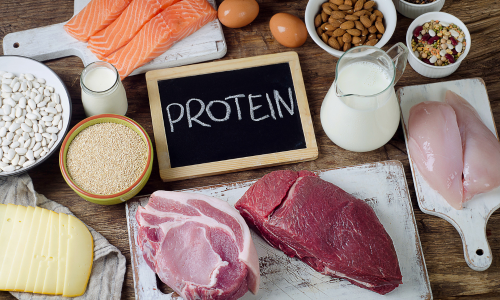Fuel Your Goals with Protein
August 31, 2023

It’s no secret that protein is key for proper nutrition. Which is why knowing why we need it can be important for making informed dietary choices. Protein is an essential macronutrient for building, maintaining, and repairing the tissues in the body. It is made up of molecules known as amino acids. There are many different types of protein, each with its own unique set of amino acids and functions in the body.
Amino acids are found in protein-rich foods. How much we need on a daily basis varies by person. For weight-loss, the MRC approach provides a ratio of 3:1 for proteins to carb balance to lose weight while protecting muscle mass and feeling full and satisfied between meals. However, it is also important to make sure you’re eating the right kind of proteins, rather than focusing on just the amount. Some proteins are higher in fat or sodium, so it may be less healthy to eat them as frequently as other proteins. It doesn’t mean that you can’t ever enjoy higher fat or saltier proteins (unless your doctor has recommended that you abstain from them), but it’s important to be balanced in your choices and consumption. The best way to get enough amino acids on a daily basis? Eat a wide variety of foods.

Protein supports weight management in a few different ways. First, as a dense food source, it can help you feel satiated. It also has a high thermic effect, meaning that the body burns more calories digesting protein than it does digesting carbohydrates or fat. Protein can also help preserve muscle mass while you are losing weight, which is important for maintaining a healthy metabolism.
Due to the fact that protein is so valuable to our bodies, it has its own food group. Sources that are high in protein include meat, poultry, seafood, dairy, nuts and beans. Below are more specific examples of each of these protein sources:
- Meat: Beef, pork, buffalo, venison, lamb, sheep and rabbit
- Poultry: Chicken, turkey, duck, quail and eggs.
- Seafood: Fish, shrimp, scallops, crab, lobster and crawfish.
- Dairy: Milk, cheese and yogurt
- Nuts: Almonds, walnuts, cashews, pistachios and hazelnuts
- Beans: Black beans, pinto beans, chickpeas and kidney beans

Depending on your personal goals, you may need to supplement your protein intake in order to meet your daily goals. Whey and Collagen are two sources of protein that can support your body’s protein needs. Whey protein is found in cow's milk and is used to produce cheese. During that process, curds are separated from the liquid leaving what is known as whey. It is a nutrient-dense, nearly translucent liquid consisting of all nine essential amino acids as well vitamins and minerals such as calcium, magnesium and zinc. The liquid whey is then filtered and dried to make whey protein powder. Whey protein powder is often used as a nutritional supplement which can easily be added to smoothies, shakes, protein bars and meal replacements. Collagen protein is another type of protein that has been gaining popularity in recent years. It is made up of three important amino acids known as proline, glycine and hydroxyproline. Additionally, collagen protein has been shown to help support muscle and joint function, improve overall gut health and support skin elasticity. Incorporating collagen protein into your diet can offer a variety of other health benefits such as those just mentioned. Metabolic Research Center and the Metabolic Web Store offer a variety of collagen and whey protein supplements to support your goals.
Whether you are maintaining a healthy weight or have goals to lose weight, having a balanced meal plan that includes enough protein is key for overall nutritional and wellness.